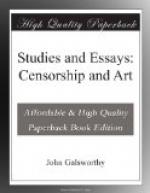I ceased again to think, for the sun had dipped low, and the midges were biting me; and the sounds of evening had begun, those innumerable far-travelling sounds of man and bird and beast—so clear and intimate—of remote countrysides at sunset. And for long I listened, too vague to move my pen.
New philosophy—a vigorous Art! Are there not all the signs of it? In music, sculpture, painting; in fiction—and drama; in dancing; in criticism itself, if criticism be an Art. Yes, we are reaching out to a new faith not yet crystallised, to a new Art not yet perfected; the forms still to find-the flowers still to fashion!
And how has it come, this slowly growing faith in Perfection for Perfection’s sake? Surely like this: The Western world awoke one day to find that it no longer believed corporately and for certain in future life for the individual consciousness. It began to feel: I cannot say more than that there may be—Death may be the end of man, or Death may be nothing. And it began to ask itself in this uncertainty: Do I then desire to go on living? Now, since it found that it desired to go on living at least as earnestly as ever it did before, it began to inquire why. And slowly it perceived that there was, inborn within it, a passionate instinct of which it had hardly till then been conscious—a sacred instinct to perfect itself, now, as well as in a possible hereafter; to perfect itself because Perfection was desirable, a vision to be adored, and striven for; a dream motive fastened within the Universe; the very essential Cause of everything. And it began to see that this Perfection, cosmically, was nothing but perfect Equanimity and Harmony; and in human relations, nothing but perfect Love and Justice. And Perfection began to glow before the eyes of the Western world like a new star, whose light touched with glamour all things as they came forth from Mystery, till to Mystery they were ready to return.




